Little Mavs Is on the Move
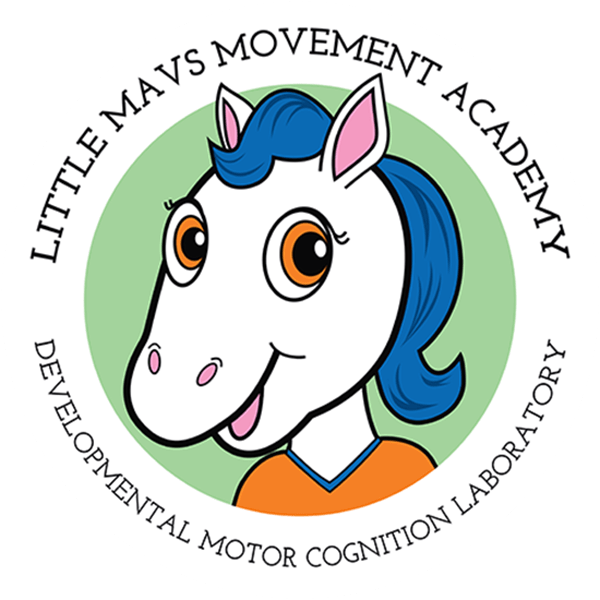
Developmental Coordination (DCD), sometimes referred to as Dyspraxia, is often called the “hidden disability.” Informally known as “clumsy child syndrome” for years, the condition is often dismissed, misunderstood, or misdiagnosed at best or unknown at worst by clinicians and laypersons alike.
As a parent of a child who struggles with motor coordination issues for which a recognized diagnostic category has been available for nearly thirty years but for which there is very little awareness or support, building a network of professionals and fellow parents is crucial.
While the prevalence of DCD is high (approximately 5% of children ages 5-11), awareness in the United States is pretty low. Relatively few educational and medical professionals in the United States have a working knowledge of the diagnosis.
Special education services for students with DCD are hit or miss. Depending on which state you live in, your child with DCD may or may not receive services under an Individualized Education Program (IEP) (Other Health Impaired) or a 504 Plan.
Specific intervention programs are also virtually nonexistent.
Or at least they were.
Until Little Mavs Movement Academy.

Little Mavs Movement Academy
Little Mavs Movement Academy is a part of the Developmental Motor Cognition Lab at the Department of Kinesiology at the University of Texas at Arlington and is run by Associate Professor Dr. Priscila Tamplain.
While not a substitute for individual occupational, speech, or physical therapy services, the community program is a one-of-a-kind group approach to intervention for students facing movement challenges.
How Does Little Mavs Help?
Motor coordination difficulties pose a challenge in early childhood and adolescence putting students at risk for bullying, behavioral problems, and low self-esteem. Children with DCD in particular struggle with common childhood games and sports and are at risk for obesity and health issues in relation to typically developing peers.
Led by Dr. Tamplain and supported by the efforts of students and volunteers, Little Mavs makes learning fun. Participants are assigned a mentor for the semester. In each session, the mentor engages the participant in all sorts of different activities, such as arts and crafts to hone fine motor skills, and games or challenges to strengthen balance, coordination, and gross motor skills.
Our Experience with Little Mavs
It was a desire for information that led me to Dr. Tamplain’s door (well, her email inbox, actually). In early 2021, we were in the middle of our second year of homeschooling and looking to expand our support network.
While we are an active homeschool family, participating in various sports and extracurriculars, we sought connection with families whose children faced similar physical challenges.
An internet search for DCD support groups and specialists in the United States led me to a YouTube video originating several years prior from a local CBS DFW news crew spotlighting Dr. Tamplain’s (then Priscila Cacola) program. The excitement was palpable as it dawned on me that this very unique program was within reasonable driving distance from our home!
At the time of my discovery, due to the pandemic, Little Mavs had transitioned to a virtual-only program but with the promise of resuming in-person gatherings in the near future. By the fall of 2021, those hopes became reality. I contacted Dr. Tamplain for our assessment and we were signed up as participants.
On our first day with Little Mavs, we were introduced to our son’s mentor, and off they went to play. I watched from the sidelines with the other parents and felt the tension slowly melt away as my son’s nervous hesitation at participating faded. It was quickly replaced by the joy that only comes with understanding and acceptance. He was safe here. And he knew it.
No one was going to pick him last for the team. No one was going to remark on his hand-flapping. No one was going to poke fun at him for being unable to skip or ride a bike.
On the surface, the session resembled a big “play date.” And it was, but it was also so much more.
From the audience, I watched every child receive personalized attention, both individual and group. Dr. Tamplain made the rounds herself, connecting with every child and becoming reacquainted with returning participants like old friends reconnecting after time apart. This was more than researchers gathering data and professionals in training. This felt like extended family.
Over the course of the semester, I watched each mentor get to know his or her student well as bonds formed. Through these bonds, I witnessed magical moments. Victories big and small.
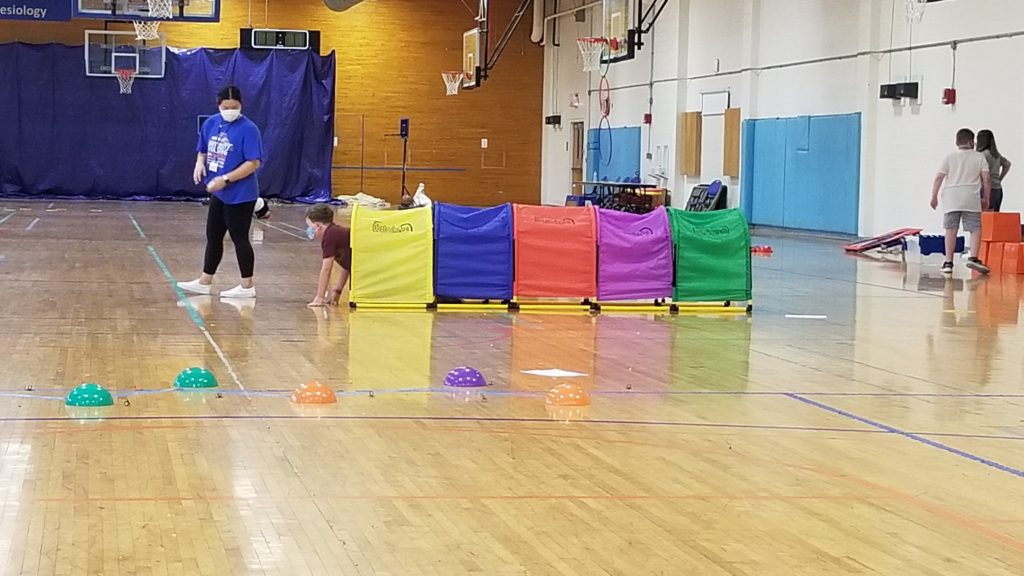







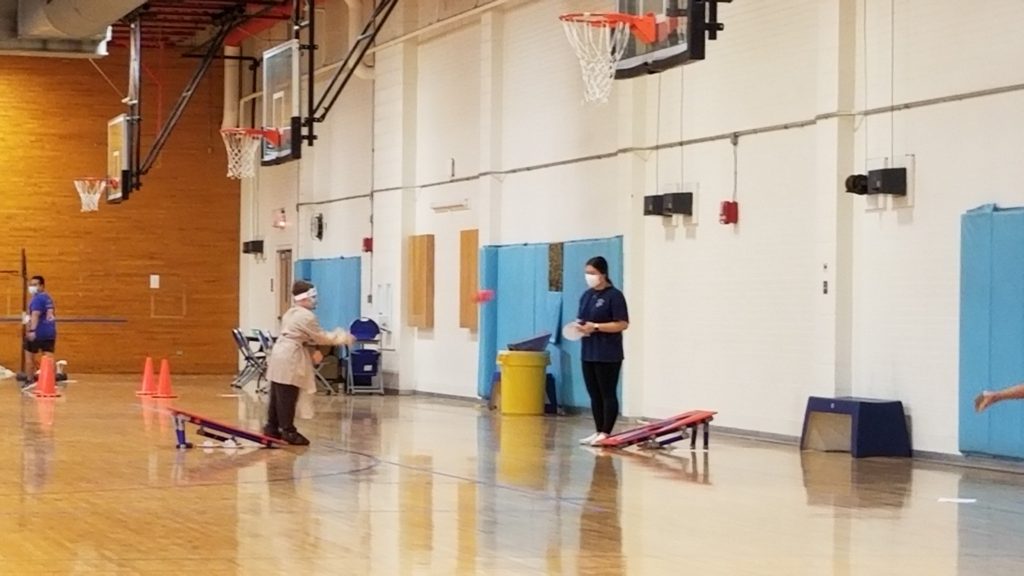
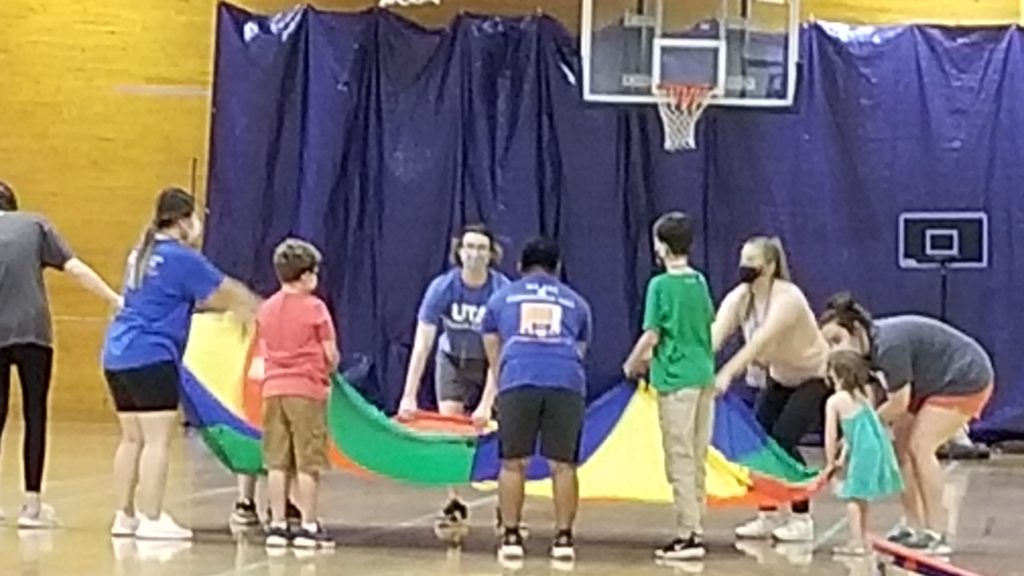
Comfort in Community
Through our weekly sessions, bonds formed among the parents, too. A misty-eyed mom seated next to me excitedly showed me her daughter’s craft from the first half of the evening’s session. To anyone outside our little group, it resembled any other early childhood art project. But for this cohort of parents, the significance was much more profound.
I looked on intently watching her trace the lines of her daughter’s creation knowing full well the hard-won effort it took to reach milestones most take for granted. Sitting upright in a chair, proper pencil grip, cutting with scissors, and coloring inside the lines may seem inconsequential to many, but to her (and to me years prior), they were reasons to celebrate indeed.
The appreciation went deeper because of all I had learned about her during our weeks sitting side by side and cheering our children on. I was humbled to be privy to this mom’s story. A journey that had led her to uproot her entire family from several states away and relocate to Texas in hopes of working with Dr. Tamplain, one of the few DCD specialists in North America.
The years of switching from one pediatrician to the next, each one like the one before offering inaccurate diagnoses. The battles with public education to accommodate and modify for learning differences. The sacrifices her family made to pay out-of-pocket for specialized therapy services when insurance denied coverage. The insult to injury when the costly services provided minimal benefit due to improperly aligned treatment goals from either misdiagnosis or lack of knowledge about the proper diagnosis.
And then.
The relief at finding allies.
The joy of success.
This was no simple craft. It was a triumph for her beaming little girl! It was confirmation of this mom’s instinct to seek what was best for her child. It was validation for her pursuit of proper care.
This is just one of the many stories I heard over the semester. As we watched our children soar, our families found a connection. We were seen and heard. Information and support networks were built. Friendships were born.
There is great comfort in community.
How Do You Participate?
Unfortunately, scheduling conflicts with other homeschool activities prevented my family from participating in the spring 2022 session but we will never forget our time with Little Mavs. We hope to return one day. An even bigger hope is for Little Mavs to inspire similar programs to inception across the United States.
Do you live in the DFW Area and want to find out how your family can participate in the Little Mavs? Below is a flyer put out by the program.

Motor Development Lab at UT Arlington – Research and Intervention for Motor Development in Children
Support Little Mavs
Not able to participate? You can also support Little Mavs by donating money to help fund this community outreach program or volunteering your time. Here is how:

The Little Mavs Movement Academy needs your support.
Your gift helps the Little Mavs program provide assessments, reports, and other assistance to families while advancing critical research.
Your support also funds new equipment for programs, stipends to students working on projects, and ensures the overall coordination of our work. All donations are tax-deductible and processed through the Office of University Advancement. No donation is too small!
Questions? Please contact Dr. Priscila Tamplain at priscila.tamplain@uta.edu.
Donate – Little Mavs Movement Academy – The University of Texas at Arlington (uta.edu)
Blessings,
Kimberly
IOH Mom
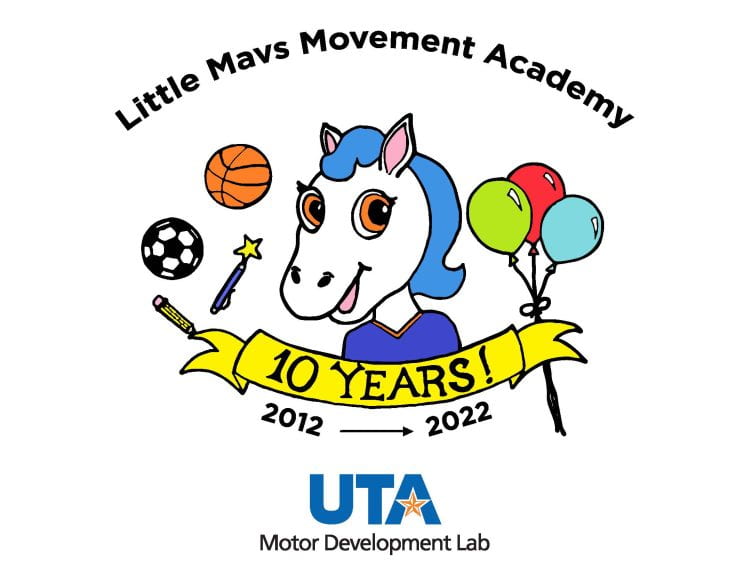
This website is not a professional counseling website and nothing here should be construed as professional counseling advice. Although Kimberly Bennett, LPC is a Licensed Professional Counselor, she is not your counselor, and no counselor-client relationship is established unless she has signed an agreement with you. All information provided through this website is for informational and educational purposes only.
